I rarely just post a link to another article. But you gotta read this article from The Atlantic on how our government, and thus our country, is treating children at border holding facilities. This is not just a national disgrace. It’s a national shame on the eve of a holiday that should celebrate our civic culture and values as a country.
Category Archives: Immigration
MoCo Deportation Defense Proposal in Danger of Falling Through
By Adam Pagnucco.
Montgomery County’s proposal for funding legal defense of people threatened by deportation appears to be in danger of falling through. Below is a letter from the MoCo Deportation Defense Coalition outlining what has happened.
*****
Dear Supporters of Deportation Defense Funding,
We are sorry to tell you that the County Council has acquiesced to the demands of the State’s Attorney, John McCarthy. The Council amended its special appropriation and added an extensive list of criminal convictions that would render a person ineligible for representation by the CAIR Coalition. This list, based on past convictions for which a person has already completed his/her sentence, includes misdemeanors and nonviolent offenses, not just serious felonies. In addition, the Council has acceded to McCarthy’s demands that there be almost no exceptions made to these criminal exclusions. This means that the CAIR Coalition cannot use County funds to challenge the deportation of a refugee or of someone who may be tortured upon return to their country. The resulting program would be far more restrictive than others around the country.
As a result, the CAIR Coalition is withdrawing its request for the money. The MoCo Deportation Defense Coalition supports CAIR’s decision and opposes the resolution in its current state. Join us at a press conference hosted by CASA and supporters on Monday at 1:30 pm in front of the State’s Attorney’s Office and come to the formal vote on the functionally-defunct resolution on Tuesday at 1:30 pm. Please read on for more information about why we support CAIR’s withdrawal and what you can do to show your opposition to the Council’s decision.
Why the MoCo Deportation Defense Coalition supports the CAIR Coalition’s refusal to participate in the County’s hobbled deportation defense special appropriation:
CAIR estimates that the restrictions would reduce the number of people who could be represented by approximately 70 percent. The remaining 30 percent would not necessarily be the County residents most likely to receive relief under immigration law. The restrictions would leave many County residents who could obtain relief from deportation if they had a lawyer, without one;
The Council’s program reflects an ill-informed and unjust approach to deportation defense funding that we should not support. Our criminal justice system has been shown to treat people of color and immigrants unfairly. An extensive exclusions list furthers the toxic narrative perpetuated by our President of immigrants as bad, undesirable, and irredeemable people. Deportation defense funding is about due process for all, so all people who qualify for relief under our harsh immigration laws can have a fair shot at getting it, regardless of their ability to pay for a lawyer;
The process through which the resolution was amended reflects a dangerous and undemocratic approach to policy-making. The County’s lead prosecutor, an elected official who is not a member of the County Council and has no expertise in immigration law, declared by fiat his requirements. McCarthy accepted almost none of the CAIR Coalition’s multiple attempts to compromise. Our Council members deferred to McCarthy despite letters and testimony by immigration experts, including former immigration judges and attorneys, arguing against criminal exclusions;
The Council’s proposed program is far more restrictive than others around the country; Baltimore’s publicly funded program has no criminal restrictions at all and Prince George’s County’s exclusions list is smaller than the list that the CAIR Coalition originally agreed to.
What Can You Do? Join Us:
Monday, May 21, 1:30 pm Press Conference @ 50 Maryland Avenue, Rockville (the Office of the State’s Attorney). Speakers will explain what happened and why John McCarthy’s involvement was inappropriate and unjust.
Tuesday, May 22, 1:30 pm Council Session to vote on the special appropriation @ 100 Maryland Avenue, Rockville (3rd Floor). We will stand silently and hold up our signs during the vote.
Bring signs to both, suggestions include: Deportation Defense: Due Process For All; No MoCo McCarthyism; Immigrants are not political pawns; No sham votes; John McCarthy Is Not A Councilmember; Due Process For All, Not For Some
Share this email with other deportation defense supporters!
We promise to keep fighting for deportation defense funding in Montgomery County with the new County Council and with private funders. We hope you will continue to join us in this fight!
In Solidarity,
The MoCo Deportation Defense Coalition
Deportation Legal Defense is the Montgomery Way
By Seth Grimes.
Someone asked me earlier this week, “What is Montgomery County doing really well?”
My answer: We are a welcoming, compassionate, and inclusive community. That’s the Montgomery Way.
The Montgomery Way: Our $312 million Health & Human Services budget funds an array of programs that assist our most vulnerable neighbors. Our “inclusionary zoning” approach to land use has made the County an affordable housing leader. And we stand with our immigrant neighbors, including undocumented individuals, in the face of Trump Administration attacks and Republican congressional complicity.
Let’s credit County Executive Ike Leggett with shaping this ethos, which includes a policy of public-safety non-cooperation with federal immigration authorities. Yet attacks on immigrants are intensifying, nationally and here in the Washington DC area. We must respond. Let’s consider two ways we can strengthen local protections.
Montgomery County should fund deportation legal defense and pass a Community Trust Act that formalizes ICE non-cooperation as County law, a step promoted by CASA de Maryland.
Momentum toward these local steps has been building over the course of Donald Trump’s year in office. A start: I recall a productive Takoma Park Mobilization meeting with County Councilmembers Marc Elrich and George Leventhal last February at my office, to broach both ideas. (I’m a Mobilization co-founder; the Mobilization grew out of a November 11, 2016 Rally for Community, taking place the Friday after Trump’s election, that I initiated to show solidarity with immigrant and Muslim neighbors.)
Progress can take time, however; in the last year, the threat to undocumented neighbors has only grown. It’s time to act.
A Montgomery County Deportation Defense Coalition is pushing for action, for funding in the County’s FY19 budget. The Coalition’s argument: “Immigrants in deportation proceedings are not entitled to court-appointed counsel. This means that immigrants who cannot afford to hire an attorney must represent themselves. Per a nationwide study by the University of Pennsylvania School of Law, represented immigrants are 5.5 times more likely to win their case than non-represented immigrants.” Implicit is that it is our collective duty to stand with and support our neighbors facing deportation.
Public deportation legal defense funding could support and expand the work done by organizations such as Kids In Need of Defense (KIND), which seeks to ensure that every child in the immigration system has a lawyer. Ayuda and the Capital Area Immigrants’ Rights (CAIR) Coalition also provide legal services to individuals facing deportation. We’re not talking about a new assignment for the County Attorney.
There’s more we can do. A new Maryland Legislative Coalition, working closely with ACLU PeoplePower, is backing the Maryland SAFE Act, currently before the General Assembly. SAFE stands for Supporting All Families Everywhere; PeoplePower is an initiative dedicated to grassroots action in defense of civil liberties. The SAFE Act, HB 1461, was introduced Delegate Ana Sol Gutierrez. It would limit Immigration cooperation by state authorities and provide immunity and indemnification for officials who do not cooperate. SAFE is another form of deportation legal defense. I testified for 2017’s failed Maryland Law Enforcement and Governmental Trust Act, and I support this year’s very similar SAFE Act in addition to local, Montgomery County action.
Deportation legal defense is the Montgomery Way, a set of concrete steps we can and should take to ensure that ours remains a welcoming, compassionate, and inclusive community. The Trump Administration is targeting our immigrant neighbors. Deportation legal defense is an important way we can stand up and fight back.
Seth Grimes is a candidate for County Council At-Large.
Hogan Demagogues on Immigration to Raise Money
By Adam Pagnucco.
Governor Larry Hogan is now sending out fundraising letters for his reelection campaign. Much of the language is consistent with what we have heard from the Governor before and would be standard for many Republican candidates. But the solicitation ends with a fear-mongering assault on immigration that is perfectly consistent with the GOP in the Era of Trump.
Hogan’s four-page letter starts as you might expect. He discusses “failed liberal leadership” and people being “sick and tired of politics as usual.” He refers to himself as “simply a small businessman, concerned citizen and lifelong Marylander who was fed up with the never ending tax and fee increases and status quo politicians in Annapolis.” He then goes on to describe how he changed all that by passing three budgets with no tax increases, reducing or eliminating fees and getting rid of “job-killing regulations.” Amusingly, he claims, “I was not a politician when I ran for Governor in 2014… and I am not one now.” So far, this is unremarkable. This has been the Governor’s message for years and we would expect this to show up in a fundraising letter.
But then he closed with this.
We have to fight back. Maryland’s future depends on it.
With so much at stake, I am reaching out to committed commonsense conservatives from across the state. You are one [sic] our state’s most loyal activists and I could really use your help. Will you please do me the honor of joining my team to help keep moving Maryland forward and help me push back against a far left agenda and the worst instincts of an increasingly liberal and out-of-touch State Legislature?
How out of touch are they? Instead of focusing on positive change and the safety of our citizens, they have instead been focusing their efforts on trying to make our state a safe haven for criminals here illegally.
Let me be very clear: we cannot allow Maryland to become a sanctuary state. Our local law enforcement should be doing more – not less – to make sure criminals here illegally are turned over to federal immigration officials. The rule of law must come first and we will do whatever we can to stop any so-called “sanctuary bills” that would limit how jails and police could assist federal authorities.
Astonishingly, this letter was sent to a Democrat in Montgomery County.
Hogan is not telling the truth about the Maryland Trust Act, which passed the House of Delegates but not the Senate. The bill that passed the House would not have prevented jails from turning criminals over to ICE and it would not have forbidden counties from participating in the federal government’s 287(g) program to identify criminals wanted by ICE. It would have prevented jails from holding inmates past their sentence dates without a court warrant, which simply restates the policy followed by Hogan’s own state-run jail in Baltimore. It would also have prevented police from questioning people on the street about their immigration status, something that happened in Bel Air just a few months ago. Does Hogan favor detaining people past their sentence dates and having local police randomly check residents’ immigration status without cause? Perhaps he does since he inaccurately attacks this legislation as a “sanctuary bill.”
The broader point is that Hogan is using immigration demagoguery and fear-mongering to raise money. That is very different from the image he cultivates in public of being non-partisan, non-ideological and uninterested in divisive social issues. In this fundraising letter, we see the Real Hogan away from the cameras and the press podium – a politician willing to exploit fear and xenophobia to get reelected.
Our current President would no doubt approve.
Hogan Exploits Rape for Politics
By Adam Pagnucco.
Governor Larry Hogan is now exploiting the rape of a Rockville high school student to get a political edge over General Assembly Democrats. It’s a clearly deplorable tactic. But will it work?
Two big stories are colliding at the moment to further inflame the volatile issue of how to deal with illegal immigration. First, the House of Delegates has passed a version of the Maryland Law Enforcement and Trust Act, a bill to limit state and local cooperation with U.S. Immigration and Customs Enforcement (ICE) so that immigrant communities will not hide from police for fear of arbitrary deportation. Second, two students at Rockville High School have been arrested for raping a 14-year-old at the school and were subsequently alleged by ICE to be present in the country illegally.
Governor Hogan reacted with the Facebook post below, saying:

The post garnered 700 shares and 500 comments in its first five hours, accomplishing its purpose of throwing gasoline on the fire of the immigration debate.
The implication of the Governor’s post is that Montgomery County does not currently cooperate with federal authorities. But in fact, it does. The Washington Post’s Bill Turque summarized the county’s immigration policy a month ago:
Montgomery police operate under a 2009 directive that bars officers from conducting “indiscriminate questioning” of suspects, witnesses or prisoners about immigration status. Once in custody, all prisoners are fingerprinted, and arrest information goes into state databases, where it is available to ICE. If the agency identifies an undocumented prisoner, it can send the county a “detainer” notice, asking that the person remain in custody for at least 48 hours beyond the scheduled release date.
The county complied with detainers until 2014, when the Maryland attorney general’s office issued an opinion advising localities that they could be liable for damages by holding prisoners past their release date.
Since then, Montgomery officials said, the county honors detainers only if they are supported by a federal court order or warrant. It will also provide ICE publicly available release dates of undocumented immigrants who have committed felonies and whom the agency is seeking to deport.
The county has released hundreds of prisoners to ICE since 2012, though the pace of releases has dropped since the county stopped honoring 48-hour detainers. The amended version of the House-passed Trust Act resembles county policy. On the Rockville High School rape suspects, County Executive Ike Leggett said, “The county — consistent with our longstanding policy — will cooperate fully with ICE to see that the two are deported to their countries of origin.”
Why would Hogan insinuate that Montgomery County does not cooperate with federal law enforcement to protect its citizens? Hogan knows that there is little support in the community for protecting violent criminals from deportation. A new CNN poll finds that 60% of Americans believe the government should be “developing a plan to allow those in the U.S. illegally who have jobs to become legal residents,” but it also finds that 78% of Americans believe that “the government should attempt to deport all people currently living in the country illegally who have been convicted of other crimes while living in the U.S.” Big majorities of every demographic group measured support the latter statement, including 64% of Democrats.

Depicting Maryland’s largest local jurisdiction as soft on crime is bad enough. Exploiting a rape for political gain is even worse. Such tactics expose just how hard the Governor can throw his elbows in partisan combat. Forget about engaging with General Assembly leaders to develop good public policy; the Governor has never been interested in that. But the cold political truth is this:
If Hogan can get away with characterizing Democrats as protectors of rapists and other criminals, he wins.
Explaining Hogan’s Stance on Syrian Refugees
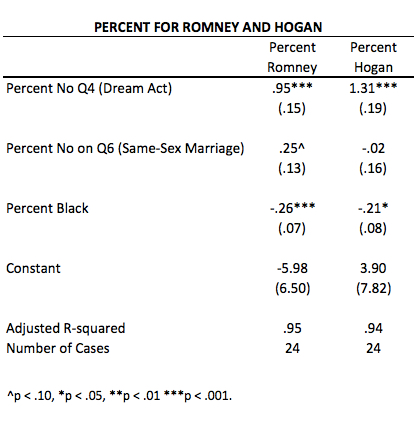 Yesterday’s post showed the strong relationship between the share who voted No on Question 4 in 2012 (the Maryland Dream Act) and support for Romney and Hogan across Maryland counties. Today, I look at models that control for other variables to test whether immigration or other factors best predicts support for Republican candidates in our state.
Yesterday’s post showed the strong relationship between the share who voted No on Question 4 in 2012 (the Maryland Dream Act) and support for Romney and Hogan across Maryland counties. Today, I look at models that control for other variables to test whether immigration or other factors best predicts support for Republican candidates in our state.
Immigration is Powerful
Immigration dominates other factors when explaining GOP support at the county level. The Romney model projects that Romney gained an estimated 9.5% additional votes for every 10% increase in the share who voted against the Dream Act.
Immigration has an even stronger relationship on the vote for Gov. Larry Hogan–he gained 13.1% more votes for every 10% who voted No on Question 4. So Hogan did a better job than Romney of magnifying the anti-immigration vote.
Same-Sex Marriage
Same-sex marriage was on the ballot in 2012 and a source of disagreement in the presidential campaign. As the state became the first to vote Yes on marriage equality, a 10% rise in support for marriage for equality cost Romney an estimated 2.5% of the vote.
Two years later, when support for marriage had increased further according to the polls, Hogan did his best to minimize discussion of the issue and take it off the table. He succeeded. Unlike for Romney, views on marriage equality had no impact on support for Hogan.
The Politics of Syrian Refugees
In his successful effort to win the Governor’s Mansion, Gov. Hogan downplayed his views on same-sex marriage. Hogan has wisely stuck with this approach of doing nothing to please social conservatives beyond stating his personal support for their viewpoint.
Immigration is also a complex issue for Hogan. A thumping majority voted for the Dream Act in 2012. Yet the above models demonstrate immigration’s strong salience to Hogan’s base. Politicians can only afford to tick off their base so much.
What to do? From a calculated political point of view, Hogan pleased his base by opposing Syrian refugees. He also probably doesn’t mind to the extent that his stand is being drowned out in the media by more hysterical reactions by other governors and presidential candidates, as it minimizes the number of alienated pro-immigrant voters.
Notes on Other Factors
Beyond the factors tested above, I also looked at the share of Asians and Hispanics as well as median household income. None had a significant impact on the support for Hogan or Romney once the immigration was included. I should note that income frequently has a bigger impact in surveys than at the aggregate level. Unfortunately, I had no easy measure of county attitudes on economic issues, as opposed to income. African-American areas voted more heavily Democratic according to the models but the impact is lower than one might expect after controlling for immigration.
Anti-Immigrant Sentiment and Republican Support
While yesterday’s post looked at the growth of anti-immigrant, radical right populist parties in Europe, today turns back to Maryland. Specifically, just how closely linked is anti-immigrant sentiment to support for Republicans?
The election results from Question 4 from 2012 provide a handy snapshot of the views of voters on immigrants. Question 4 asked voters if they wanted to keep in place the Maryland Dream Act. The pro-immigrant side won a big victory when 58.9% of Marylanders voted in favor of allowing undocumented immigrants to pay in-state college tuition under certain conditions.
The county results on Question 4 turn out to be an excellent predictor of how each county voted in the 2012 presidential election. The scatterplot below shows that the share of a county’s voters that supported Romney or Hogan tended to increase in line with the share who voted no on Question 4.
 This was not a one off, as the same is true for the 2014 gubernatorial election. Support for the Republican Larry Hogan tended to rise with the share who voted no on Question 4.
This was not a one off, as the same is true for the 2014 gubernatorial election. Support for the Republican Larry Hogan tended to rise with the share who voted no on Question 4.
 The correlation between the share who voted no and the share who voted for Romney in each county was a very high .96. (Correlations have a maximum of 1, which would indicate that one factor perfectly predicts the other.) The correlation between the no vote and vote for Hogan was the same .96.
The correlation between the share who voted no and the share who voted for Romney in each county was a very high .96. (Correlations have a maximum of 1, which would indicate that one factor perfectly predicts the other.) The correlation between the no vote and vote for Hogan was the same .96.
The next part of this series in immigration will compare the strength of immigration to other issues and demographic factors as predictor of election outcomes.
Anti-Immigrant Parties on the Rise Internationally
Recent work by Marisa Abrajano and Zoltan Hajnal shows that views on immigration drives American voting behavior. But is the same occurring in other countries?
A number of west European (i.e. not formerly Communist) countries have anti-immigrant parties. Known as radical right, right-wing populist, and extreme right, these parties vary quite a lot in their levels of xenophobia. But they have in common their desire to decrease immigration and hostility to to the European Union.
Has their support increased? The following graph shows total support for radical right parties by year for all parliamentary elections since 2000 in 13 countries:
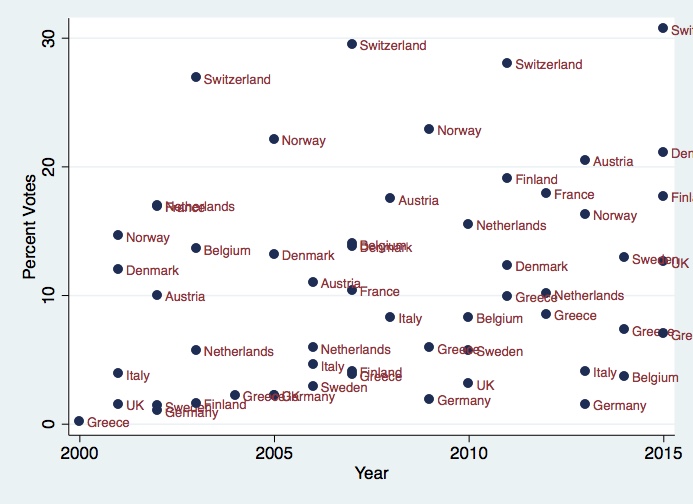 The point cloud in the graph does not immediately suggest growth in support in recent years. Statistical models, however, paint a different picture:
The point cloud in the graph does not immediately suggest growth in support in recent years. Statistical models, however, paint a different picture:
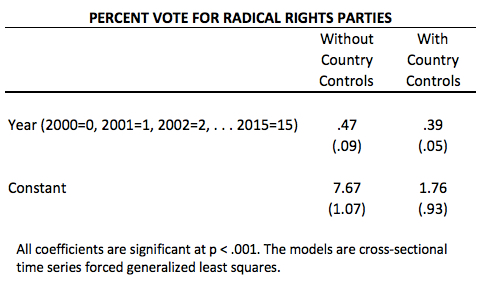 Both models assess simply whether support for radical right parties increased with time. The second model also includes controls for each of the 13 countries.
Both models assess simply whether support for radical right parties increased with time. The second model also includes controls for each of the 13 countries.
The two models indicate that support for anti-immigrant radical right parties has grown. The model with country controls shows that their vote has increased by an estimated 0.39% per year from 2000 through 2015. (Models not shown here indicate that growth in their support is not concentrated in the most recent five years.)
Why do the models indicate a steady increase in support for anti-immigrant parties even though no pattern emerges in the point cloud? A close examination of the data from individual countries reveals the answer. The following table shows support for radical right parties in parliamentary elections held since 2000:
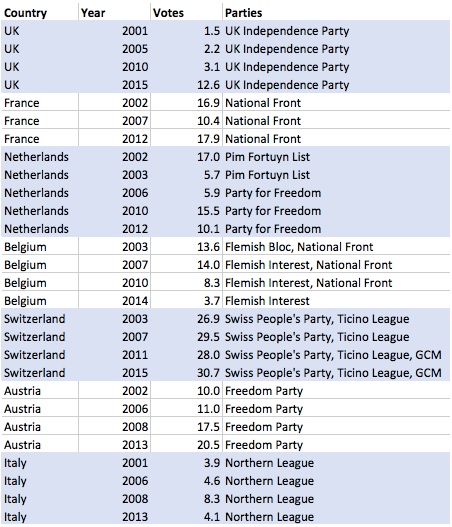
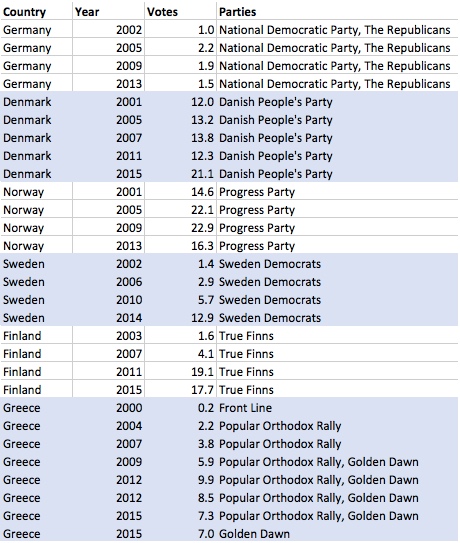 In several countries, anti-immigrant parties have gained substantial support since 2000. The True Finns received just 1.6% support in 2003 but 17.7% in elections held earlier this year. Extreme right Greek parties, such as neo-Nazi Golden Dawn, garnered 7-10% of the vote in recent elections, higher than the 0-6% they won prior to 2010. In Austria, the Freedom Party won 20.5% support in 2013–more than double their support in 2002.
In several countries, anti-immigrant parties have gained substantial support since 2000. The True Finns received just 1.6% support in 2003 but 17.7% in elections held earlier this year. Extreme right Greek parties, such as neo-Nazi Golden Dawn, garnered 7-10% of the vote in recent elections, higher than the 0-6% they won prior to 2010. In Austria, the Freedom Party won 20.5% support in 2013–more than double their support in 2002.
In the UK, Sweden and Denmark, support for anti-immigrant parties jumped substantially in elections held this year. The UK Independence Party (UKIP) won a 12.3% of the vote and the Sweden Democrats won 12.9% in this year’s elections. The Danish People’s Party earned 21.1% of the vote, much higher than their previous record of 13.8%.
Other countries have seen smaller changes, or less consistent changes, so the countries where the radical right has gained strength drive the results in the statistical model. Only Belgium has seen support for the radical right decline as the small National Front has disappeared and Flemish Interest has lost support to the New Flemish Alliance–nationalist but not radical right.
Are these trends likely to continue? Excluding countries that held elections this year (and Germany), polling in eight countries says yes. Taking the latest three polls from these countries suggests that average radical right support will jump from 12.2% to 20.3% in the next election. (Note: French results are from presidential rather than legislative elections.)
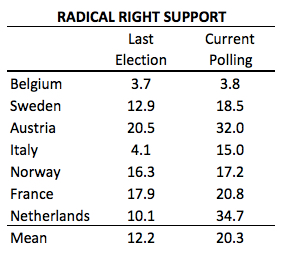 In short, the ongoing refugee crisis in Europe appears to be driving up support for anti-immigrant parties. The intensified battles over immigration in the U.S. reflect similar debates occurring in many other democracies.
In short, the ongoing refugee crisis in Europe appears to be driving up support for anti-immigrant parties. The intensified battles over immigration in the U.S. reflect similar debates occurring in many other democracies.
In future posts, I hope to bring the lens back to Maryland and the U.S. on the politics of immigration.
Dreamers Confront Rep. Steve King
The Washington Post has caught this video capturing Dreamers confronting Rep. King with the reality of his beliefs. He tells a young woman raised in the country–a graduate of Arizona State University–that she understands English well and then asks if she is a drug smuggler. A young man points out to Rep. King that the first soldier to die in Iraq was undocumented who replies that “he lied to get into the military.” Can you feel the empathy? But more to the point, they have a real exchange about the issue.
Torres Defends O’Malley in WaPo
CASA Executive Director Gustavo Torres wrote a letter to the editor of the Washington Post defending Gov. O’Malley’s actions on undocumented children:
The July 28 editorial “Mr. O’Malley’s rhetoric — and reality” implied that Maryland Gov. Martin O’Malley (D) needs to do more to confront the immigrant crisis at the border, relying, in part, on a quote from me. Nothing could be further from the truth.
The governor has used his national profile at the most critical moment to refocus the conversation appropriately. This is a crisis of children fleeing unthinkable situations, kids that deserve our support. Mr. O’Malley was the first nationally prominent Democrat to challenge the White House’s attempt to roll back due-process protections for children, and, thanks in part to his leadership, many congressional leaders and prominent state representatives now agree.
Maryland has had the largest per-capita placement of unaccompanied minors by the federal government, with 2,205 sponsored children this year, according to the Office of Refugee Resettlement.
Maryland has jurisdictions that are solidly progressive, solidly right-wing and in the middle. Those that are solidly progressive are most amenable to addressing this crisis in a humane fashion. We believe, like the governor, that these are the locations where children should be housed before they are hopefully united with family members or placed in foster care. This is not, as The Post implied, political expediency.



